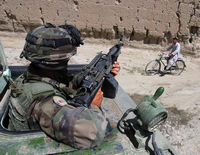The armored truck came apart in a puff of smoke and debris. It was Aug. 20, election day in Wardak province, Afghanistan, southwest of Kabul. U.S.-led forces in Afghanistan had braced for increased levels of violence on this day. But the massive bomb -- constructed of a plastic barrel with a nitrate fertilizer filler -- that struck the American truck was more than anyone expected. Of the two U.S. Army soldiers riding in the front of the vehicle when the bomb struck, one was seriously injured. Specialist Justin Pellerin, 21, the driver, died instantly.
Improvised Explosive Devices (IEDs) are taking an escalating toll on coalition troops. Twenty-nine of the 53 coalition fatalities in the first three weeks of September died in bomb blasts, according to a list compiled by icasualties.org. There are now so many IEDs on Afghanistan's roads that some units, including Pellerin's, say it's no longer a question of whether they'll be hit on a given day, but exactly when and where. U.S. Marines in southern Afghanistan have largely stopped using main roads, and instead travel cross-country, relying on GPS and dead reckoning to arrive at their destinations.
In Iraq three years ago, the U.S. military feared that a growing number of increasingly lethal bombs might render American troops immobile and powerless, forcing the U.S. to surrender initiative to Iraq's insurgents. But a combination of better blast-proof trucks, radio jammers to block detonation signals, more surveillance drones to spot bombs and an uptick in the arrest of bomb-builders, all helped break the IEDs' death-grip.

